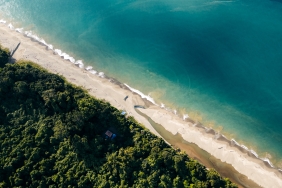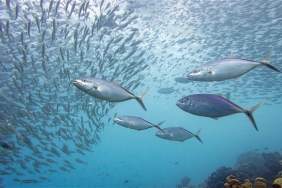INDONESIAN VANAME SHRIMP PRODUCTS GET ECOLABEL CERTIFICATION
Jakarta, February 2019 – WWF-Indonesia gives high appreciation to PT Mega Marine Pride for obtaining Aquaculture Stewardship Council (ASC) certification for vannamei shrimp (Litopenaeus vannamei) in January 2019 This shrimp producer assisted by WWF-Indonesia received ASC certification for 68 intensive ponds covering an area of 23 ha in Jember Regency, East Java belonging to its supplier, PT Delta Guna Sukses.
Indonesia is the 3rd largest aquaculture producing country in Asia after China and India. Aquaculture practices have long been in the spotlight since their activities have the potential to be bad for the environment. As a solution, since 2009 WWF-Indonesia has developed the Seafood Savers platform to assist fishing companies in achieving ASC sustainability standards for aquaculture -- and the Marine Stewardship Council (MSC) for capture fisheries. Both of these certifications refer to the United Nations Food Agency's Code of Responsible Fishing Conduct (CCRC).
As a member of Seafood Savers, PT Mega Marine Pride joined the WWF-Indonesia Aquaculture Improvement Program (AIP) scheme in December 2017. During the AIP process, the WWF-Indonesia team worked together with the Directorate General of Aquaculture (DJPB) The Ministry of Maritime Affairs and Fisheries of the Republic of Indonesia provides assistance with activities to improve shrimp commodity fisheries which refer to the ASC sustainability principles.
"Achieving the ASC standard is a form of our commitment as a businessman to realize vannamei shrimp farming that can maintain a sustainable ecosystem balance," said Junita Dwi Lia, Director of Supervision & Quality Control of PT Mega Marine Pride. "We appreciate the support from WWF-Indonesia, the Ministry of Maritime Affairs and Fisheries of the Republic of Indonesia, and PT Delta Guna Success, so that the ASC certificate can be achieved. We are committed to maintaining consistency and expanding the scope of ASC certification so that we can improve quality in a sustainable manner according to the company's vision and mission," added Junita.
Fulfillment of the principle is carried out in order to minimize the impact of cultivation on the environment through habitat rehabilitation activities, efficient use of resources, responsible use of feed, waste management and maintenance of shrimp health. In addition to impacts on the environment, the company's AIP also aims to manage social impacts related to workers and society.
During December 2017 to January 2019, it was recorded that PT Delta Guna Sukses had made internal policies in accordance with Standard Operating Procedures (SOP), built a Wastewater Treatment Plant (IPAL) to reduce the impact of waste water pollution, and held activities for planting 2,700 mangrove trees and 1,800 jaran trees as an effort to reforest the beach. All repair activities are carried out with the support and involvement of the Government of Jember Regency, East Java.
During these three years, apart from PT Mega Marine Pride, there are two WWF-Indonesia assisted companies that have succeeded in fulfilling the sustainability principles for ASC cultivation practices. The two are PT Mustika Minanusa Aurora who received ASC Tiger Shrimp certification for a 100 ha pond using the traditional method in North Kalimantan in August 2016 and PT Bumi Menara Internusa which received the ASC Vaname Shrimp for a 9 ha pond using the intensive method in East Java. In the future there will be more and more assisted companies that will follow the process to fulfill the principles of sustainability.
"The obtaining of certification by these three companies shows the enthusiasm of WWF-Indonesia, DGT KKP RI, and aquaculture business players in Indonesia to practice fishery business according to the principles of ecosystem balance and pond environmental sustainability," said Dr. Imam Musthofa, Director of Marine and Fisheries Program WWF-Indonesia.
"Through fulfilling eco-label certification, fishery entrepreneurs play a major role in safeguarding the future of fishery resources and increasing the competitiveness of Indonesian fish products in the global market. Although it is not easy to achieve this, we are optimistic that more and more Indonesian seafood producing companies will try and succeed in fulfilling the principle of sustainability. ,” he added.
It is fitting that the company's determination can be thoroughly facilitated by relevant stakeholders such as the central and regional governments, NGOs and academics, so that more and more business actors can fulfill the principles of sustainability. That way, this synergy can accelerate the realization of sustainable fisheries in Indonesia.
-END-





